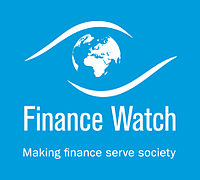
Les banques continueront d’être sauvées de leurs faillites avec l’argent des contribuables, selon Finance Watch (photo © GPouzin)
Dix ans après la vague de faillites bancaires qui a faillit faire basculer le monde entier dans le chaos, les banques ont fini d’enterrer les tentatives de mieux encadrer leurs spéculations pour prévenir une nouvelle crise. C’est en tout cas l’analyse de Finance Watch, dans un communiqué publié ce matin que Deontofi.com reproduit ci-dessous.
Comme Deontofi.com l’avait déjà signalé avec la fausse loi de séparation bancaire française de 2012, les lobbies bancaires européens ont sabordé les efforts politiques pour renforcer les fonds propres et responsabiliser les banques et leurs dirigeants dans leurs prises de risque. La directive sur la résolution et le sauvetage des banques (Bank Recovery and Resolution Directive, BRRD), prévoyait initialement de responsabiliser les actionnaires et créanciers des banques, appelés à remettre au pot pour bénéficier d’un sauvetage financé par les contribuables en cas de faillite.
 Mais selon Finance Watch, ce projet a été totalement corrompu par les lobbies bancaires, de telle sorte que l’amalgame entre tous les créanciers des banques (actionnaires, autres banques et spéculateurs de marché, clients-épargnants) rende l’application de ce principe impossible. Résultat, l’aléa moral demeure la pierre angulaire de l’enrichissement bancaire. L’aléa moral (ou moral hasard) est le principe selon lequel les banquiers sont incités à prendre des risques irresponsables conduisant généralement à des crises et faillites bancaires, car leur rémunération flambe quand les risques qu’ils prennent s’avèrent profitables, alors qu’ils n’ont aucune sanction ni argent à débourser quand ces mêmes risques mènent à la catastrophe. En effet, les banques continueront à bénéficier de sauvetages financés par les contribuables, voire par les clients, à la prochaine crise. Voilà comment les banques préparent leur prochaine crise.
Mais selon Finance Watch, ce projet a été totalement corrompu par les lobbies bancaires, de telle sorte que l’amalgame entre tous les créanciers des banques (actionnaires, autres banques et spéculateurs de marché, clients-épargnants) rende l’application de ce principe impossible. Résultat, l’aléa moral demeure la pierre angulaire de l’enrichissement bancaire. L’aléa moral (ou moral hasard) est le principe selon lequel les banquiers sont incités à prendre des risques irresponsables conduisant généralement à des crises et faillites bancaires, car leur rémunération flambe quand les risques qu’ils prennent s’avèrent profitables, alors qu’ils n’ont aucune sanction ni argent à débourser quand ces mêmes risques mènent à la catastrophe. En effet, les banques continueront à bénéficier de sauvetages financés par les contribuables, voire par les clients, à la prochaine crise. Voilà comment les banques préparent leur prochaine crise.

« La dernière ligne de défense contre les crises systémique a été encore affaiblie », estime Christian Stiefmϋller, expert en régulation bancaire auprès de l’ONG Finance Watch à Bruxelles.
La santé des banques est un point essentiel à surveiller pour les investisseurs en Bourse. Grâce à la politique de répression financière de la Banque Centrale Européenne (BCE) ayant réduit ses taux d’intérêt à zéro, les banques bénéficient depuis plusieurs années de conditions de crédit leur permettant d’engranger des profits exceptionnels (elles prêtent à des taux assez rémunérateurs l’argent qu’elles empruntent gratis). Mais on connaît la fragilité de cette situation au moindre retournement dans les secteurs qu’elles ont le plus financé. Avec la chute des cours du pétrole à 30 dollars le baril fin 2015 (jusqu’à 26$/bl le 11 février 2016), on avait craint par exemple que les difficultés et faillites en chaîne du secteur pétrolier (Vallourec, CGG) et des pays dépendants de recettes pétrolières (Brésil), n’entraîne leurs banques créancières dans la tourmente (hausses des créances douteuses, provisionnement, retards d’échéances et défauts de paiement…). On a vu aussi la vulnérabilité des banques lors de la crise de solvabilité de la Grèce (2010-2012, défaut de paiement partiel le 21 juillet 2011). On sait aussi leurs déboires pour avoir financé aveuglément des rachats d’entreprises à crédit (leverage buy-outs) notamment par des fonds d’investissements. Et c’est sans parler des crises de surendettement les plus classiques qui font régulièrement plonger des banques trop exposées au financement d’immobilier résidentiel, et parfois de bureau, comme dans les années 1990 ou avec la crise des subprimes de 2007-2008.
Pour en savoir plus sur ce sujet:
- Pourquoi les banques critiquent les taux d’intérêt trop bas (5/6/2016)
- La lutte des banques contre la taxation de leurs transactions spéculatives (21/8/2015)
- De l’absence de sanction dissuasive au sentiment d’impunité dans les banques (19/8/2015)
- Trading haute fréquence: un trou noir de fraudes boursières à la vitesse de la lumière (22/5/2017)
- Vos comptes bancaires sont-ils mieux protégés qu’avant ? (24/1/2016)
- Les secrets inavouables de la fausse loi de séparation bancaire (5/5/2014)
- Le complot des banques contre la séparation de leurs activités spéculatives (5/5/2014)
Parliament compromises on bank safety
ECON agreement on banking package contains distinct moves to deregulation
Brussels, 21 June 2018 – The ECON Committee of the European Parliament on Tuesday adopted a compromise on the Banking Package proposed by the European Commission in November 2016. The Package comprises substantial amendments to the Capital Requirements Regulation and Directive (CRR/CRD IV), the Bank Recovery and Resolution Directive (BRRD) and the Regulation governing the Single Resolution Mechanism (SRMR).
Finance Watch’s Senior Research and Advocacy Advisor, Christian M. Stiefmüller, said:
“Billed as the incorporation of the last round of the Basel Committee’s Basel III reforms into EU law the compromise text bears all the hallmarks of two years of relentless lobbying by the banking industry. The compromise, which will now be negotiated in Trilogue, is a minimalistic and reluctant attempt at combining formal compliance with Basel III with a distinct move towards deregulation. Every time a balance had to be struck between financial stability and the commercial interests of the banking sector, financial stability has reliably come out in second place.”
While the compromise makes welcome progress in some areas – notably proportionality for smaller banks, and environmental, social and management issues – the provisions concerning financial stability and moral hazard are disappointing.
The bank recovery and resolution regime, last line of defence against a systemic crisis after the sad demise of the proposed Bank Structural Reform Regulation, has been further weakened by a proposed approach to creditor subordination that blithely ignores fundamental differences between bank customers, suppliers and investors and is bound to render the “bail in” tool practically unworkable in many cases. MREL, the amount of funds that may be used for recapitalising a troubled bank, is being capped and resolution authorities’ discretion severely curtailed. By blunting their most critical instruments policymakers have made the resolution authorities’ near-impossible task that little more impossible still.
At the same time, known problem areas, such as the “precautionary recapitalisation” clause that has now been used repeatedly to justify the use of taxpayers’ money to prop up ailing banks – which has been overdue for review for two and a half years now – have not been addressed.
New rules on capital, in particular the leverage ratio as one of the few genuinely new concepts that were introduced as a result of the abject failure of the Basel II capital adequacy framework, are now being implemented at the bare minimum level to claim formal compliance with Basel III. Technically, however, they have been watered down at every possible opportunity.
The EU, already the only major jurisdiction to be found “materially non-compliant” by the Basel Committee in important aspects of the Basel III regime, is moving even further away from the international standard.
Mr Stiefmüller said:
“The readiness of European policymakers to deviate from the Basel Committee’s international standards to cater for the interest of European banks does not bode well for the future of international cooperation on trade and finance and sends precisely the wrong signal at the wrong time.
“This Package was meant to be the last big building block of the decade-long effort to learn from, and respond to, the lessons of the financial crisis of 2008. We now face the very real risk of having to face the next financial crisis with a framework that, albeit marginally improved, has not adequately repaired the flaws that caused the last financial cataclysm, not to mention the new challenges that have emerged since, such as the relentless rise of the shadow banking sector.”
European Parliament press releases:
Bank resilience: Economic affairs MEPs back EU plans to adopt Basel III rules, 19 June 2018
Troubled EU banks: economic affairs MEPs approve refined resolution framework, 19 June 2018
Finance Watch materials on the banking package:
ABOUT FINANCE WATCH
Finance Watch is a European, not-for-profit association of civil society Members, dedicated to making finance work for the good of society. It works for a financial system that allocates capital to productive use through fair and open markets, in a transparent and sustainable manner, in line with society’s needs and without exploiting or endangering society at large.
Finance Watch Members are supported by a professional full-time secretariat recruited mainly from the financial and policy sectors, with strong communications and stakeholder engagement capacities, to conduct advocacy and provide technical know-how and coordination for our civil society network.
